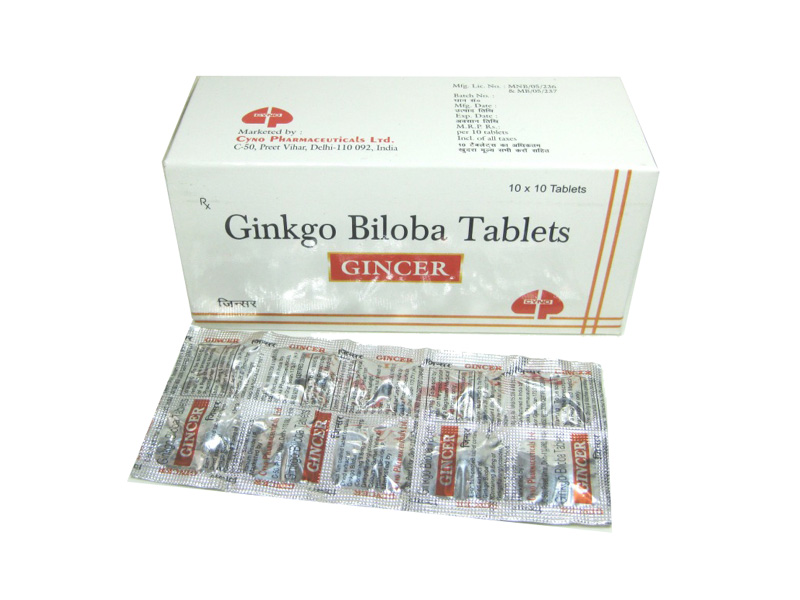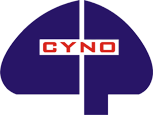GINCER
Ginkgo Biloba (40 mg)
Gincer Tablet is used for the improvement of brain function and memory and other conditions. Gincer Tablet keeps Ginko Biloba as an active ingredient. Gincer Tablet works by dilating blood vessels, increasing blood supply, reducing blood viscosity, modifying neurotransmitter systems, and reducing oxygen free radicals. It is used to treat altitude sickness, cerebral vascular insufficiency, cognitive disorders, dementia, dizziness, intermittent claudication, macular glaucoma, memory loss, premenstrual syndrome, SSRI-induced sexual dysfunction, and as a vasodilator.

Mechanism of Action
The therapeutic effect of Ginkgo Biloba is attributed to the active ingredient specifically a blend of flavo-glycosides, which have free radical and antioxidant properties, and terpenes, which have anti-inflammatory properties. One of the main effects is by inhibition of platelet-activating factor (PAF).
PAF, produced by many tissues, is associated with the aggregation of platelets as well as bronchoconstriction, vasoconstriction, chemotaxis of phagocyte hypotension, and the release of inflammatory compounds of phagocytes that inhibit PAF, blocking all of these effects. And so making clots reduces the bronchospasm further.
Gincer has also been found to improve sexual dysfunction caused by SSRI medications such as Prozac, Luvox, Paxil, and Zoloft. Asthma control benefits are due to gingko’s anti-allergic properties.
Indications:
Dosages are usually based on the severity of the symptoms and the type of problem. On average administration should last not less than 6 weeks. In very severe cases, at least 8 weeks. However, cases of tinnitus and vertigo 6-8 weeks are usually considered sufficient.
Pharmacokinetic Properties:
The bioavailability of the main active ingredient in Gincer, ginkgolide B was assessed. The study focused on pharmacokinetics 80 mg for giniser 80 mg administered orally daily for 40 days and 40 mg twice daily for 7 days. . Statistical analysis was used to assess the main pharmacokinetic parameters. Results indicate that a 40 mg dose twice daily (every 12 hrs) is significantly longer than a single 80 mg dose, with a longer half-life (TO) and median dwell time (MRT). However the latter causes a high concentration peak (Cmax). The maximum concentration-time (Tmax) is 2.3 hours. After administration in both treatments.
Drug-Drug interactions:
If you are currently being treated with any of the following medications, you should not use ginkgo without first talking to your healthcare provider:
Anticonvulsant drugs:
High doses of ginkgo Biloba may reduce the effectiveness of anticonvulsant therapy in patients taking carbamazepine or valproic acid to control seizures.
Blood thinners:
Ginkgo has blood-thinning properties and should therefore not be used if you are taking anticoagulant (blood-thinning) medicines such as aspirin, clopidogrel, dipyridamole, heparin.
Silosporin:
Ginkgo biloba may be beneficial during treatment with cyclosporine as it can protect cell membranes from damage.
Monoamine oxidase inhibitors (MAOIs):
Ginkgo can increase the effects (both good and bad) of antioxidant drugs, known as MAOIs, such as phenelzine and tranylcypromine.
Papaverine:
The combination of papaverine and ginkgo may be effective for the treatment of erectile dysfunction in patients who do not respond to papaverine alone.
Thiazide diuretic:
Although there is a literature report of an increase in blood pressure associated with the use of ginkgo during treatment with thiazide diuretics, this interaction has not been verified by clinical trials.
Precautions:
Before taking this product, tell your doctor or pharmacist if you are allergic to it; Or if you have any other allergies. This product may contain inactive ingredients, which may cause allergies or other problems. Talk to your pharmacist for more details.
If you have the following health issues, consult your doctor or pharmacist before using this product: bleeding problems, diabetes, seizures.
Ginkgo may reduce blood clotting ability. Before having surgery, tell your doctor or dentist that you are taking this product. Stop taking this product at least 2 weeks before your surgery unless directed by your doctor. Ask your doctor when it is safe to start using this product after your surgery or procedure.
Liquid forms of this product may contain sugar and/or alcohol. Caution is advised if you have diabetes, alcohol dependence, or liver disease. Ask your doctor or pharmacist about using this product safely.
Ginkgo is not recommended for use during pregnancy. Consult your doctor before using this product.
Breastfeeding:
This herb is not recommended for nursing mothers – protection has not been established for use in pregnancy because many ingestive substances are excreted in human milk.
Fertility:
No specific studies with G. Biloba in humans have been conducted to evaluate effects on fertility
Dosage:
Gincer 80 mg once daily and 40 mg twice daily for 7 days.
Duration of action:
Treatment should last for at least 8 weeks.
If there is no symptomatic improvement after 3 months, or if the symptoms of the disease should intensify,
The physician should check whether continuation of treatment is still appropriate.
Adverse Reaction:
Generally, Ginkgo biloba leaf extract in typical doses can cause mild gastrointestinal upset, headache, dizziness, nervousness, constipation, and allergic skin reactions. Large doses may cause restlessness, diarrhea, nausea, vomiting, and weakness.
Storage:
Store in a cool place. Protect from light.
Overdosage:
No case of overdose has been reported
Contraindications:
If you have hemophilia or have any other clotting disorder, do not use it without a doctor’s approval and monitoring as Gincer has been reported to have anticoagulant activity.
According to recent studies on drug and herb interactions.
Do not handle fruits if you are allergic to poison ivy, mango peel, and cashew shell oil, as they are structurally similar to gincer allergies.
Pregnancy. Do not use while pregnant – Safety has not been established for use in pregnancy. Some contraindications exist.
Side effects:
The following adverse reactions have been reported as associated with the use of Gincer but are considered rare in their occurrence:
Diarrhea, Edema, Erythema, Headaches, Irritability, Nausea, Restlessness, Vomiting
The following adverse reactions have been reported as associated with the use of Gincer when taken in conjunction with a blood thinner:
Spontaneous hyphema, Spontaneous bilateral subdural hematomas, Retinal hemorrhage, Clotting problems
Warnings:
Some people have an intolerance to consuming gincer in any amount – if any adverse effects are seen, stop it immediately.
Do not use if pregnant or nursing (no clinical data available)
Should not be used for children under 2 years of age
Use with doctor’s approval only when used with children older than 2 years of age.
Pregnancy:
There is a lack of information about safety and efficacy in pregnancy and lactation. Ginkgo should be used with caution during pregnancy, especially around labor due to prolonged bleeding risk, and should be avoided during breastfeeding.
Children Use
This Gincer is not recommended for children under the age of 2 years.
